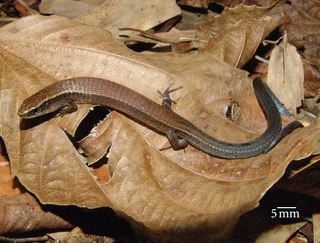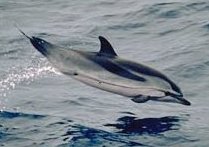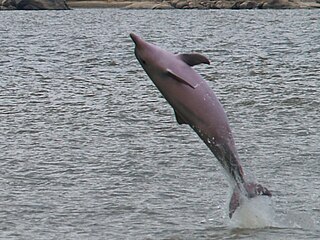Anotosaura is a genus of South American lizards in the family Gymnophthalmidae.

Colobodactylus is a small genus of lizards in the family Gymnophthalmidae. The genus is endemic to Brazil.

Stenella is a genus of marine mammals in Delphinidae, the family informally known as the oceanic dolphins.

Amaral's Brazilian gecko is a species of nocturnal geckos from the arid Jalapão Region, Minas Gerais/Bahia (Brazil). It is a bluish-gray, oviparous tree-dwelling species, feeding on herbivorous insects and other invertebrates. It has immovable, or fixed eyelids. Being nocturnal, it has vertically oriented pupils. They have a life span of about 6–13 years and are sexually mature at 6–9 months old. They are about 13 cm long and 2 cm wide. They cannot change their colour. When attacked by a bird, they run in circles, confusing the enemy. When attacked by a ground animal, they climb a high tree, run in tall grass, or try to hide under leaves, rocks, and other things they can find. They are one of the smartest geckos on the earth, and are not endangered.

Bothrocophias is a genus of venomous snakes, pit vipers in the subfamily Crotalinae of the family Viperidae, known by the common name toadheaded pit vipers. The genus is endemic to South America.

The Terebellidae is a marine family of polychaete worms, of which the type taxon is Terebella, described by Carl Linnaeus in his 1767 12th edition of Systema Naturae.

Eustigmatophytes are a small group of eukaryotic forms of algae that includes marine, freshwater and soil-living species.

Leucopternis is a Neotropical genus of birds of prey in the family Accipitridae. They are associated with tropical forest, and are uncommon or rare. Their plumage is largely black or gray above and white below, and they have distinctive orange ceres.
Calamodontophis paucidens, the tropical forest snake, is a species of snakes in the family Colubridae. The species is endemic to South America.
Calamodontophis ronaldoi is a species of snake in the family Colubridae. The species is endemic to southern Brazil.

The dolphin genus Sotalia is considered to have two member species with the classification of Sotalia guianensis as a distinct species from Sotalia fluviatilis in 2007. This was a result of recent morphometric analyses, as well as mitochondrial DNA analysis.

Amaral's blind snake is a species of snake in the family Leptotyphlopidae. The species is native to South America.

Tinaminyssus is a genus of mites in the family Rhinonyssidae. There are more than 60 described species in Tinaminyssus.

Atractus is a genus of colubrid ground snakes in the subfamily Dipsadinae. The genus includes more than 140 distinct species.

Mastigodryas is a genus of colubrid snakes. Like some other colubrids, they are commonly called racers. It is a Neotropical genus, with members distributed from Mexico to Argentina and several islands in the Caribbean. Some authorities use the older generic name, Dryadophis, for these species.

Dipsadinae is a large subfamily of colubroid snakes, sometimes referred to as a family (Dipsadidae). They are found in most of the Americas, including the West Indies, and are most diverse in South America. There are more than 700 species.

Cratera is a genus of land planarians found in South America.

Pasipha is a genus of land planarians from South America.

Apostolepis is a genus of snakes in the subfamily Dipsadinae. However, the familial placement differs among sources. It has also been placed in the family Colubridae, subfamily Dipsadinae or Xenodontinae, or in the family Xenodontidae. The genus Apostolepis is endemic to South America.















